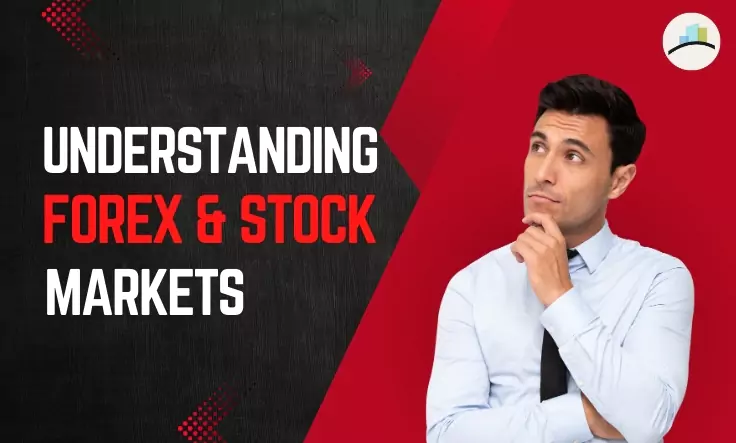In the fast-changing world of finance today, it's super important for investors to get what sets different markets apart.
Two big players in this game are the Forex (Foreign Exchange) market and the Stock market. Each one works a bit differently,
so let's take a closer look to see what makes them tick and how they're alike or different.
What is the Forex Market?
The Forex market is like a big marketplace where people from all around the world trade different currencies. Instead of buying and selling shares of companies like in the stock market, here, folks exchange one currency for another.
They do this hoping to make money from changes in the value of these currencies compared to each other.
It's kind of like swapping your dollars for euros when you think the euro will become more valuable, and then changing them back when you think the dollar will be stronger. This constant exchange of currencies makes the Forex market a bustling hub of activity that operates 24 hours a day, five days a week.
Forex Derivatives Example
Let's picture a scenario to understand how Forex, or foreign exchange, works. Imagine you're at a snack shop buying samosas.
If you buy and eat a samosa right away, it's like a regular spot market deal - you get the samosa instantly. But if you predict that potato prices might go up and make a deal with the seller to buy a samosa at a set price in the future,
that's similar to how currency futures work. You're agreeing on a price now for a samosa you'll get later, just like in the Forex market where people agree on exchange rates for currencies they'll trade in the future.
Participants in the Forex Market
The Forex market, where people trade different currencies, has many types of players involved. These include big banks, financial companies, and even governments.
But regular folks, like you and me, also take part, thanks to something called currency derivatives markets. In places like India, these markets settle profits and losses in the local currency,
making it easier for everyday people to get involved and trade currencies.
What is the Stock Market?
The stock market is like a giant marketplace where people buy and sell pieces of companies that are available for everyone to invest in.
Instead of trading currencies like in the Forex market, here, it's all about buying and selling shares of companies that are publicly listed, meaning they're available for anyone to invest in. When people want to buy shares, they use their own money to do so.
Sometimes, they might trade using other financial tools called equity derivatives. Overall, it's a place where investors come together to trade bits of companies in exchange for money.
Components of the Stock Market
The stock market is like a big playground with different parts. One part is the cash market where people buy and sell actual shares.
It's like trading cards – you give someone money, and they give you a share of a company. Then there's the derivatives market, which is a bit more complicated.
Here, people don't buy or sell shares directly. Instead, they make bets on whether the price of a stock will go up or down without owning the stock itself. It's like predicting if it will rain tomorrow without actually feeling the rain.
Both parts have their own rules and ways of working, but together they make up the stock market where people can invest and make money.
Difference Between Forex and Stock Market
Underlying Asset
The main difference between the Forex and Stock markets is what they're based on. In Forex, people trade currency pairs, like the euro and the dollar.
But in the Stock market, it's all about buying and selling pieces of companies, which we call shares.
So, in simple terms, Forex is about trading money, while the Stock market is about trading parts of companies.
Market Hours
The Forex market is always open, every hour of every day, all around the world.
But each region has its special times when trading is busiest.
On the other hand, the Stock market follows set hours for trading, which are different depending on where you are in the world.
Liquidity
Liquidity means how easy it is to buy or sell something without affecting its price. Forex markets, where currencies are traded, are usually really liquid because there are always people buying and selling currencies.
But in the Stock market, where you trade company shares, liquidity can change a lot. Some popular stocks have lots of people buying and selling them, making them very liquid.
But other stocks might not be as popular, so there aren't as many buyers and sellers, making them less liquid.
Leverage
Leverage is really important when you trade. It's like a tool that helps you control bigger things with a smaller start. In trading, like forex and stocks, leverage isn't the same.
Forex trading usually lets you use more leverage than stocks. This means you can control bigger trades with less money upfront.
So, if you're trading forex, you might be able to do bigger things with less money compared to trading stocks.
Settlement
Settlement in trading means how deals get finished. Different types of trading use different ways to settle. In Forex, when you trade currencies, the deal is usually settled with cash.
But in the stock market, settlements can happen in two ways: one is by giving equity, which means you get shares of a company, and the other is cash settlement, where you get money.
Which type of settlement happens depends on what you're trading.
FAQs
What factors influence currency values in the Forex market?
Currency values are influenced by various factors, including economic indicators, geopolitical events, interest rates, and market sentiment.
Can retail traders participate in the Forex market?
Yes, retail traders can access the Forex market through online trading platforms provided by brokers.
Are there any similarities between the Forex and Stock markets?
Both markets are influenced by global economic conditions and geopolitical events, albeit to varying degrees.
Is leverage available in the Stock market?
Yes, leverage is available in the form of margin trading in the Stock market, although typically at lower levels compared to the Forex market.
How can investors mitigate risks in both markets?
Diversification, risk management strategies, and staying informed about market developments are essential for mitigating risks in both Forex and Stock markets.
Conclusion
The connection between the Forex and Stock markets is noticeable despite their differences. Changes in currency values can affect stock prices, and vice versa.
For instance, events like interest rate changes or political tensions can cause both markets to move together.
Knowing about these connections can help investors make smart choices when dealing with finances.
In summary, while the Forex and Stock markets have separate roles, understanding how they relate can give investors an edge in managing their investments.
Differentiating between the two markets is important for investors aiming to spread their investments. The Forex market deals with currencies, while the Stock market handles company shares.
Understanding how they work, how easy it is to trade, and how transactions are finalized is crucial for wise investing.











 1,499
1,499
